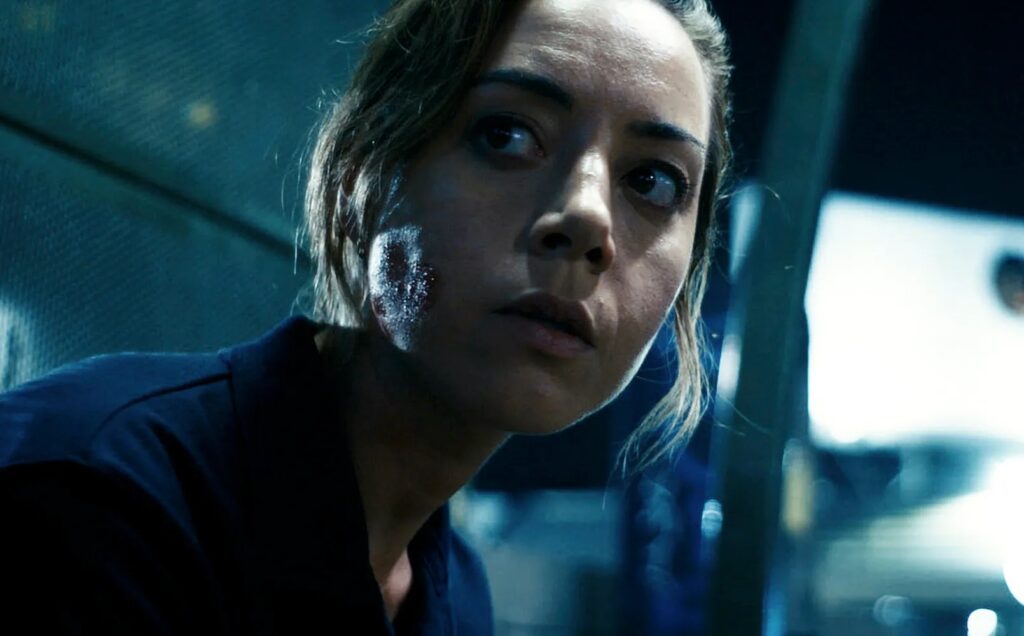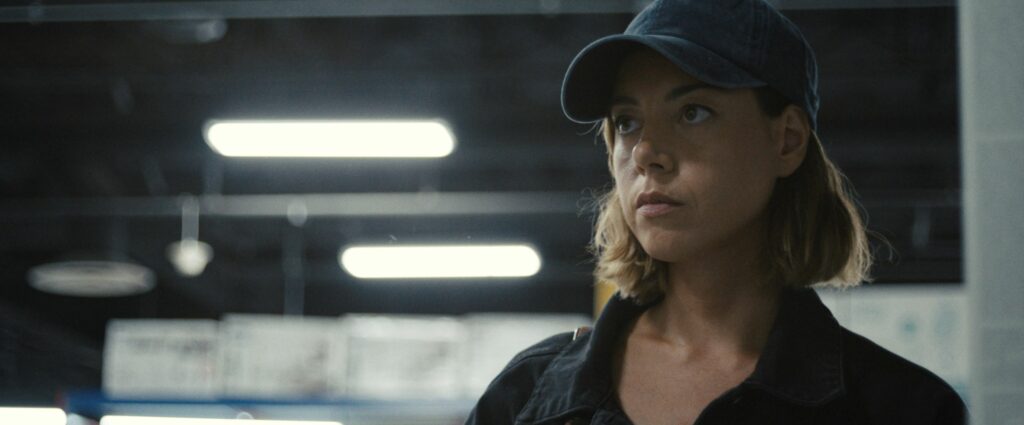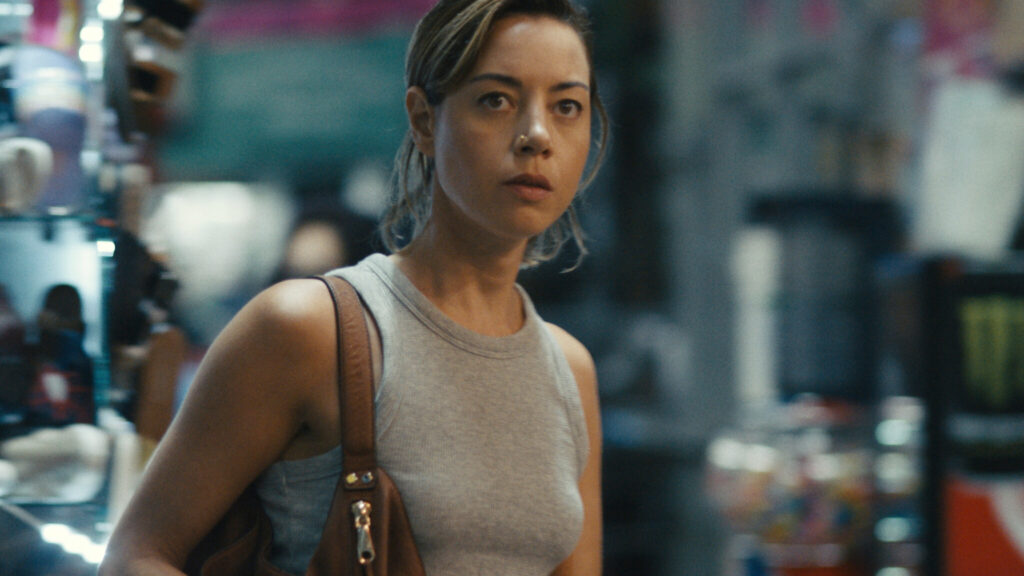Aubrey Plaza stars as the titular character in John Patton Ford’s thriller, Emily the Criminal, a young woman saddled with student debt who is locked out of the job market due to a minor criminal record. Desperate for income, she takes a shady gig as a ‘dummy shopper’, buying goods with stolen credit cards supplied by a charismatic middleman named Youcef (Theo Rossi). Faced with a series of dead-end job interviews, Emily soon finds herself seduced by the quick cash and the thrills of this black-market operation, as well as by her mentor, Youcef. Together, they hatch a plan to bring their business to the next level and are pulled deeper into the criminal underworld of Los Angeles.
Ahead of Emily the Criminal’s debut, Outtake sat down with writer-director John Patton Ford and star Aubrey Plaza to discuss the script’s emotional relevance, celebrating righteous anger and selfishness, and upending storytelling expectations.

What inspired this script?
John Patton Ford: I think I had the idea for a thriller that just starts with someone going to a meeting and being offered a job opportunity. There was nothing personal about it – it was a hook, just a mercenary idea I had. Only over time did it become personal. And then it was a couple of years after I had the idea that I began to think about her character, specifically as the person who would do this. It took time to figure out what was personal and what was emotional, but we got there eventually.
As for you Aubrey, what sold you on this project?
Aubrey Plaza: The script sold me on the whole thing because the script is really good. I couldn’t believe it, I read it so fast. It’s just all there. I just felt like, immediately, my brain was buzzing, and I could just see how good the movie could be. I was really excited about it, and I love the character. I think there’s something so unexpected about everything she does in the movie, which got me really excited to play her. Playing a character that stands up for herself, fights back, and doesn’t take shit from anybody is just really fun. And I felt she was really relatable, like she could speak to an entire generation of young people going through the exact same thing.
Has the reaction to the film in the US been different than in other countries, where student loan debt is perhaps less of an issue than in the States?
John Patton Ford: For sure. We haven’t had a tonne of opportunities to go to other places and see how it fares, but I got to see it in France, and now in the UK. I found that in France, for instance, people were intellectually curious about it whereas, in the States, it’s a primal hurt. Most people under the age of 40 have at least $35-40,000 in student loans which you can never get rid of, even if you declare bankruptcy! It’s a reality that everyone seems to live with.

So, with this movie, either people don’t want to even go there because it reminds them of a current trauma in their life, or when they do, it’s not enough for them. They’re like, “I need her to go murder people now.” It really taps into the communal frustration people have.
It’s interesting because the subject of female rage on screen tends to be framed as something for the character to overcome. Yet here, it’s very much celebrated – it’s what drives her, and what gets her to where she wants to be. Could you speak on the significance of that?
John Patton Ford: I can’t speak to the female part of it really. I thought about her as an individual, but never as a woman. That’s not really where I was coming from. But I knew that I didn’t want the lesson to be that she learns to live with her anger. I wanted her to be proven right and I didn’t want society to get to hold her accountable. Why should she be held accountable? She’s stealing from insurance companies that haven’t paid their taxes in 50 years – how about we hold them accountable? I really believe that.
Aubrey Plaza: What’s fun about her journey is that with most stories, the character’s journey starts at the beginning, and you go from zero to 100. But when this script starts, she’s already had enough. We’re coming in really hot, right from the start, and then it escalates even further than you think it will. And I think that’s what’s so fun about her journey and maybe her anger, her rage, is already at a ten from the very beginning of the movie. It’s just something that fuels her, and it’s not necessarily something she needs to get over.
This is a different role than what people are perhaps used to seeing you in. Was branching out of comedy something you sought out specifically?
Aubrey Plaza: I just fell in love with the script. It was a gift reading it. I don’t think I necessarily choose parts for any reason, it’s more that I want to make good movies and I felt like this would be a great film. The fact that it had a character that I could play that felt really different from anything I’d done was just a bonus.

What were the challenges of getting into Emily’s headspace? It seems like a very tiring role to take on.
Aubrey Plaza: Yeah, it was, but it was a fun time. It was a good challenge. But yeah, definitely some of the sequences were pretty exhausting. Like the robbery scene sequence, I remember that really shook me up, took a lot out of me and scared me. I mean, it felt really real, like a lot of stuff we did in the movie just felt real. Your body doesn’t really know the difference, you know? Definitely, when the shoot was over, I definitely had to shake it off. It was exhausting, and I was exhausted. When we were doing it though, it was just like an adrenaline high.
One of my favourite parts of the film is the very end. Emily makes what is objectively a selfish decision, to abandon her partner and save herself; in any other film, you would then have seen her guilt-ridden. But here, she’s rewarded for that selfishness by being happy and content, which is amazing. Was that always going to be the ending?
John Patton Ford: There are truths in my life that I don’t love and that I’m not proud to say aloud. Many of the most successful people I’ve known in my life are kind of sociopathic. They are people who have gotten to where they are, I think, largely because they don’t care about the effect that it has on others. And there is something that I found truthful about this person who ultimately does what’s best for them, gets away with it more or less clean, and is the one who wins in the end.
And I’m not saying that that’s a great thing or that that’s the way things should work, but that’s what felt most honest to me. Whereas if she was held accountable or if the authorities got her, that’s more like the storyteller moralising in a way that they find necessary, instead of reflecting what the reality might actually entail. I remember writing the first draft right after Trump was elected and I remember thinking, all the things they teach you about being a good person, and ethics, and hard work paying off… and this is the guy who’s in charge of the free world now? No, Emily is going to leave her partner for dead and she’s going to get away with it, and she’ll be okay. That’s the ending I’m going to have.
Emily the Criminal is available to rent and own from October 24th.
